Clockwork Chicken
` Eh, I figured if I'm not going to finish any more science writing very soon, at least let me make a point or two. Now, last time I did so, it was my first - and probably last - post about why I cannot find the logic of unneccisarily using animals for meat.
` (I've updated the latter part of it a couple of times.)
` I admit that entry was a rather clumsy attempt on my part to try to explain it, and I think it would have been better if I'd included a scientific slant - especially since my blog's purpose is largely for writing about science.
` However, if you are a person who is in any way concerned that needlessly making animals suffer might actually be ethically wrong, I'm not going to tell you that you have to stop eating meat in order to do something about it!
` For example, I bet you'd rescue animals if they were in trouble, wouldn't you?
` Imagine this:
` You are in a field, watching a manure spreader distribute fertilizer on a crop. But when you find yourself near an area where truck's already been, you hear the agonizing sound of a baby bird chirping pitifully on the ground.
` It isn't long before you notice that there are the bloody, disembodied limbs, heads and guts of newly-hatched chickens strewn all over the field!
` You find the source of the chirping; one of the little chicks is still alive! While it is badly mutilated, it still somehow manages to peep at you weakly.
` What would you think to yourself?
` Some people would think; "Some of the fertilizer is still alive!" Other people might just laugh and maybe crush the baby bird like an insect. Yet other people would think about whether or not they could possibly save its life!
` If you are one of the latter, it shows that you must feel some compassion towards those very different from you. And if you are wondering to yourself; 'Can I help keep live, cut-up baby birds from being used as fertilizer?' or 'What the heck was that all about?' you may want to keep reading.
` It is actually true that you might come across such a scene - this is how the males of egg-laying chickens in 'egg factories' are sometimes used: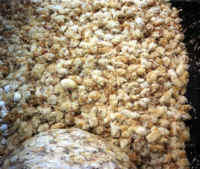
` Not long after hatching, the males are dumped onto augers, which are screws that partly grind up the baby birds while moving them into fertilizer trucks. (Many of them do survive this - they have even been known to live through being gored for twenty seconds in an industrial-strength garbage disposal!)
` If the male chicks are not used in this way, they are instead heaped - still alive and chirping - into a dumpster along with the garbage or stuffed into a trash bag to suffocate.
` And who are the people who treat baby birds like industrial waste? The factory workers whose jobs it is to be chicken sexers. You see, the life of an egg chicken on an intensive, industrial farm starts in a warehouse in the midst of machinery.
` Many tens of thousands of eggs are stacked in trays from the floor to the ceiling in different incubator rooms. When all the eggs in a room hatch at one time, there are many young lives that need to be 'processed' en masse. In the United States, this is about 20 per second, or about 600 million a year.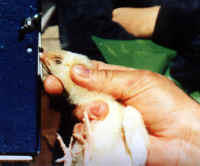 ` Fully half of those chicks are males, most of which are fortunate to die so early. The rest of them - females - will have a good chunk of their beaks hastily cut off with a cauterizing blade. (So many chicks being hatched means that they need to be 'debeaked' at a rate of one bird every couple of seconds.)
` Fully half of those chicks are males, most of which are fortunate to die so early. The rest of them - females - will have a good chunk of their beaks hastily cut off with a cauterizing blade. (So many chicks being hatched means that they need to be 'debeaked' at a rate of one bird every couple of seconds.)
` During beak amputation, the deafening sounds of screeching baby birds and machinery is the only thing you can hear, and many chicks go into shock and bleed to death from it.
` As if this wasn't enough, several weeks later the females are often then 'debeaked' again, and maybe even a third time since the handlers are inevitably heavy-handed with this speedy procedure.
` This makes the chickens reluctant to eat - or even totally unable to! Many of them starve to death. In some factories, I should note, parts of the toes are also cut off.
` If a bird rescued from an egg factory is allowed to carry out its instincts to scratch and peck at the ground - which chickens normally do even when there isn't much to peck at - it probably won't! I can only guess that the reason why is high levels of lasting pain.
` But since the animal has to eat in order to live, it is still resigned to using its remaining, raw beak-stump.
` The chickens that have neither starved to death or died of shock or disease yet are then jabbed in the back of the neck with a mechanical vaccinatior. Commonly, the injection site becomes infected, which then causes horrible illnesses, killing even more young birds.
` However, even with all these deaths, there are so many birds that the losses are not missed - in fact, they're expected and accomodated.
` That's factory efficiency for you.
` As for the surviving young hens, they will be stuffed inside of filthy, stinking battery cages for the rest of their lives, unable to move. In truth, it's pretty unbearable for a human to go into the dim buildings where they are kept - the smell burns your eyes, and the constant cries of distressed chickens pierce your eardrums.
` What is it like for the chicken, personally? Well, it takes about thirty or so inches for one hen to spread her wings; the average cage is only eighteen to twenty inches wide - about 1 1/2 feet, or roughly half a meter - and it is usually stuffed with four to eight birds so that they are permanently squashed against one another.
` When a hen dies, her half-bald cage-mates will usually be forced to live pressed against her putrefying corpse for some time before it is finally removed.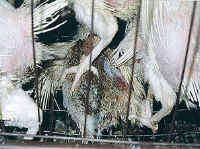 ` The tiny cages are stacked from floor to ceiling in huge rows, and in some factories, they're not even tall enough for the hens to stand up in!
` The tiny cages are stacked from floor to ceiling in huge rows, and in some factories, they're not even tall enough for the hens to stand up in!
` In fact, battery cages are not even safe for then to live in - it's not difficult to find a bird with crippled and deformed legs from standing on the diagonal mesh, and some may accidentally hang themselves on the bars. There's also always the problem of the chickens on the upper levels splattering the ones below them with their droppings.
` These cramped conditions leave no room for the animals to take a step or even move anything much but their heads - and if they should get caught in the cage so that they can't get to the food, they will be left to starve to death!
` The hens are simply forced to sit there and get pooped on, amid the overwhelmingly thick stench of droppings and necrotic (dead) tissue which they are covered with, not once being allowed to see the light of day or breathe fresh air.
` It is true that factory farms are literally factories - though this type uses living, breathing beings as part of the machinery. There are troughs that bring food and troughs that take away eggs, and the occasional maintenance worker comes in to clean up and replace 'nonworking parts'.
` After a whole year of being treated like nothing but a cog in some huge, clockwork thing, the 'spent' hens are covered in blood, feces, pus and not many feathers (from being pecked at and rubbing against the cages) and may even be missing wings, legs or eyes. It is not unusual for many to be dead before this point from various unpleasant diseases such as;
` Cage layer fatigue - this is caused by laying eggs and lack of exercise, and it's actually something that can be reversed if the hen is merely allowed to walk around. Since these chickens are not that important to anyone, they are simply left to die. However, since these hens get osteoporosis from not having enough calcium for bones and eggs, they may sustain some bone fractures before succumbing.
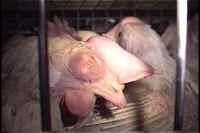 ` Swollen head is very common - and very visible! - and is caused by infections when the hens peck at each other and from the penetrating stench of ammonia and germs from rotting carcasses and droppings.
` Swollen head is very common - and very visible! - and is caused by infections when the hens peck at each other and from the penetrating stench of ammonia and germs from rotting carcasses and droppings.
` Since they are simply the 'machinery' in factory farms, there is nobody there to even kill sick birds - they are only replaced when they stop 'working.'
` Fatty liver ('foie gras') is another problem, and death often occurs when the liver ruptures from a hen straining to lay an egg. I am somewhat amused to find that if a human has this painful disease, they are advised to: '• Limit chicken and turkey that is not free range as this contains artificial growth hormones, antibiotics and steroids that increase the liver's workload.'
` Egg-bound is when a hen is unable to lay another egg. This may be caused by lack of calcium, too much fat, too large an egg - all of which is caused by their feed! - and she can easily go into shock and die due to lack of medical care. (And in a factory farm, there is no medical care...)
` Sometimes, the factory process itself involves causing the chickens bad health by purposely starving them and causing them to moult, which at the same time increases egg production.
` In addition, the neuroses that the hens develop from being forced to act as stationary machine parts cause the animals to 'cannibalize' each other - this is the purpose for amputating much of their beaks and toes. Even so, they can still manage to tear each other apart. ` So, at the one-year mark, the surviving, bloodied, diseased and filthy animals are then roughly grabbed and haphazardly flung into small wire boxes, and then loaded like so many packages into trucks headed for the slaughterhouse. Once there, they are hung upside-down by their feet - alive! - to be 'mechanically separated'. If they are lucky, they'll already be stunned or dead by the time they are scalded and essentially drawn and quartered.
` So, at the one-year mark, the surviving, bloodied, diseased and filthy animals are then roughly grabbed and haphazardly flung into small wire boxes, and then loaded like so many packages into trucks headed for the slaughterhouse. Once there, they are hung upside-down by their feet - alive! - to be 'mechanically separated'. If they are lucky, they'll already be stunned or dead by the time they are scalded and essentially drawn and quartered.
` In other words, factory hens are hatched by a machine, exist as parts of a machine, and are slaughtered by a machine.
` Considering that these chickens are in fairly bad shape, you can only find what's left of them ground or diced up in chicken nuggets, chicken pot pies, and Campbell's Chicken Noodle Soup.
` Mm-mm good!
` Not to change the subject, but since these often-crippled factory hens are fed a diet low in nutrition and high in fat, hormones, and antibiotics, the eggs from them likewise have very little nutrition and lots of fat, hormones, and antibiotics!
` This is much different than the eggs from a chicken that sees the sun, scratches at the ground and eats insects and grain. The best eggs also come from chickens fed an organic vegetarian diet, some of which will have an orange, non-runny yolk that is rich in vitamins.
` Just from looking at the eggs, you can tell they aren't products of hormone-feeding: They're all different sizes, though they tend to be small enough for the chickens to have less trouble laying them. Even so, each egg has more nutrients in it than the ones from the sick and injured hens in egg factories.
` Believe it or not, some farms are much like what people probably normally think of as 'farms' - the birds come outside each day and socialize with one another, pecking and scratching around in the grass and dirt (not each other's eyes!). They're also allowed to make nests and sometimes raise their own babies!
` For the chickens that are actually treated like animals - and not mechanisms - life's a picnic!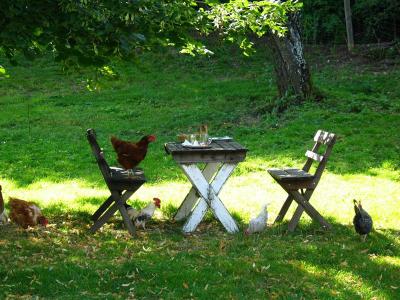 ` Sorry about the pun. (...By the way, I got that picture from this excellant animal photo page!)
` Sorry about the pun. (...By the way, I got that picture from this excellant animal photo page!)
` You can find such organic eggs in many stores and also by driving out to some of the farms in the countryside. Usually, they cost more than the factory eggs (the very point of which are their cheapness), but buying a dozen low-quality eggs at about $1.50 is still comparable to buying a dozen high-quality eggs at $2.95.
` If, say, the high-quality eggs are twice as nutritious, it costs as much as buying 24 low-quality eggs (with less saturated fat and cholesterol)!
` Truthfully, I don't actually recall the exact figures of how different the eggs are in content, but I do know that when you let eggs stay refrigerated over time, they lose some of their nutritional value, and much of the good stuff breaks down into fat. (Or something like that - sorry, I don't have all my science resources with me!)
` However, as organically-farmed eggs tend to be farmed and sold locally, there's less transport time - so that doesn't happen nearly as extensively.
` Among the most often-bought by us, personally, are Pattyken's Rainbow Eggs, which are sold at the co-op next door.
` I don't know much about this farm, though I do know that there are three roosters - all with amusing names - and that "the girls" are various rare and endangered breeds of chicken. Of course, they are allowed to walk and scratch freely about just like a barnyard fowl needs to, along with some other animals!
` I am guessing that these farmers wouldn't slaughter their chickens after their peak egg-laying years - in fact, if I remember correctly from what I learned about them, the birds were rescued! I know, it pays to be informed, but I really don't feel like driving over there to ask them right now as it's getting late.
` Anyhow, I hope I've made it clear that there is a very large difference in the way various chickens are treated, which also extends to the quality of their eggs!
` If you're already refusing to buy from egg factories, I thank you - and so might their victims, if it were possible.
` If not, you, as a free human being, can choose to support the suffering of the 'clockwork chicken', but you can also help provide for people to treat chickens like chickens (though they do take their eggs away!), or you could even give up eggs altogether!
` So, if you have at least a little heart, the very least you can do is to boycott sickly eggs laid by sickly birds who are probably still out there, rotting in their own waste.
` All you have to do is ask yourself: Which comes first - the chickens or the eggs?
` You can get a much better look at the factory hen photographs in this entry - and many, many more! - by going to this page, which is on a website called 'all-creatures.org'. Keep in mind, it is a bible-oriented vegan activist website, which actually uses words such as 'evil' and 'abomination' and 'demonic sadism'.
` Definitely not my style, but I do agree with some terms, such as 'concentration camp.'
` P.S. - Words printed on egg cartons can be misleading.
` 'Cage free' has no specific legal meaning, though it may mean that the chickens get to peck each other to death with their beak-stumps while standing around in some other kind of cramped conditions.
` 'Free range' means that life goes on the same as above - male chicks are trashed and the hens are probably debeaked, but they stand around in a huge and cramped barn, instead. However, there is a door which may be opened at least five minutes a day, though the chickens won't come out at all unless there are trees overhead or something else to tempt them.
` 'Free farmed' actually complies with the American Humane Association, and the animals are not subject to unneccesary fear, pain, or hunger. They are allowed to socialize fairly normally with others of their own kind and are provided with materials they need to carry out their normal behaviors so that they don't have anxiety attacks from not being able to, say, make a nest. Farms that comply with these regulations are inspected rigorously each year.
` So, there is a spectrum of different living conditions, and free farmed is at least guaranteed to cater to the animals to a very large extent. But extending your purchases into the country is also a good idea, especially if you know what goes on in those places. That's why it's a good thing to check out those places yourself. Make a field trip of it. (No, I haven't done that yet, but it doesn't mean you can't!)
` P.P.S - The eggs we like the most - though they aren't available all the time - are the 'choose your own' (bulk) eggs from Sky Valley Farms, where you are welcome to come to and inspect yourself.
` Someone who's been down there taped a photo they took to the fridge door. It shows the chickens who lay the brown, white, and green eggs cheerfully pecking around in a sunlit meadow.
` It makes me want to go to that place and meet those chickens.... If nothing else, I'd shake their chickeny hands, assuming they had them. Okay, I need more sleep!




4 comments:
No more egg-farm eggs for me!
I have a small feeling that the catalyst for this article was me telling you I wanted to order som KFC...
!!!
No, that was purely coincidental! I was actually thinking about the omelet I threw up the other night!
The chickens! NOOOO! Why, God? WHYYY? (They don't even get cable...)
What wickedness and horrors do men NOT KNOW?
I am proud to say that I have never bought from those criminals! You can thank my egg allergy.
Post a Comment